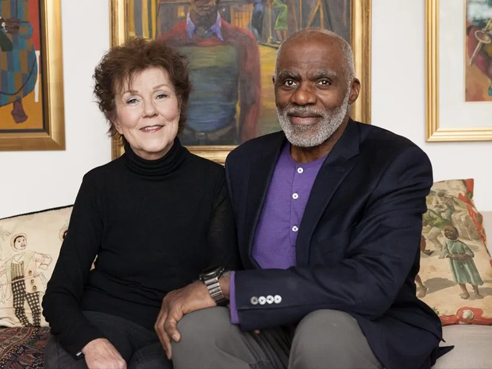Black History Month Spotlight: Alan Page
02/23/2024
Black History Month is an annual celebration of achievements by Black Americans and a time for recognizing their role in U.S. History. This week we are commemorating Alan Page.
To receive the Presidential Medal of Freedom, it takes a truly exceptional person whose impact on society is wide-reaching and will be felt long after they’re gone. To win NFL MVP as a defensive player, one needs to be dominant to a level that’s nearly unheard of as it’s only happened twice. To think both awards could be held by the same person takes something truly special, but Alan Page is exactly that.
An athlete, a supreme court judge, and a staunch advocate of youth education, Page has broken through every barrier placed in front of him. He continues to make positive change in Minnesota every day through his foundation, and countless lives have been touched by him or his work.
Born and raised in Canton, Ohio, Page knew from an early age that he was interested in being a lawyer. Fairness was something close to Page’s heart, and the rampant and daily unfairness he saw for minorities in the United States growing up would only cement his interest in law, an interest that hasn’t wavered to this day.
Before Page began working in the courtroom, he was a standout player in several sports in high school and was especially good at football. He played college football at Notre Dame and was a consensus All-American in 1966 as the Fighting Irish would win that year’s national championship. His impressive play led the Minnesota Vikings to draft him in the ensuing NFL Draft at 15th overall.

An immediate playmaker on the defensive side of the ball, Page became a star member of the famed “Purple People Eaters” along with Carl Eller, Jim Marshall, and Gary Larsen. Page was fast, and his speed paired with his physicality made it a tall order for any offensive lineman trying to block him. With an unofficial 8.5 sacks in his rookie season, he was a finalist for AP Defensive Rookie of the Year (sacks weren’t officially tracked as a stat until 1982).
Number 88 would become a fixture of the NFL Pro Bowl, as Page was named to the Pro Bowl team each season from 1968 through 1976. This included 1970 when he had seven fumble recoveries in 14 games and 1976 when he recorded an unofficial total of 18 sacks in 14 games. But he’s most known for his 1971 campaign, where he became the first defensive player to ever win NFL MVP. With nine sacks*, three fumble recoveries, and two safeties, Page dominated the line of scrimmage all season.
His efforts game in and game out led the Vikings to the final NFL Championship win before the AFL-NFL Merger, and four Super Bowl appearances. The five-time First Team All Pro also started getting involved in league legal matters while he was a player. Page was named the Vikings NFLPA representative in 1970 and became a member of the NFLPA’s executive committee two years later.
While he was a member of the executive committee, he was involved in multiple labor disputes by players as they seeked better conditions from the league. Page was also one of the plaintiffs in Mackey v. National Football League, which deemed the Rozelle rule to be illegal on the grounds of antitrust laws and helped ensure the start of NFL free agency that we see today.
Page and his wife, Diane Sims Page, got into running in the mid-70s and Alan saw his playing weight drop from the 270lb mark down below 230lb. Vikings coaches insisted he regain the weight, but Page enjoyed running, and refused to give it up. The Vikings released Page in the middle of 1978 after it seemed his performance took a downturn, and longtime rival Chicago scooped him up for the remainder of his playing career. Page rebounded strongly and in four years with the Bears added another 40 sacks to his career total.
In total, Page recorded an unofficial total of 148.5 sacks, and started 215 consecutive games from 1967 through 1981. Still one of only two defensive players to ever win NFL MVP, Page was enshrined in the Pro Football Hall of Fame in his native Canton, Ohio. He was also named to the NFL’s 100th Anniversary All-Time Team.

Once Page retired, his focus went solely into his career as a lawyer. He received his Juris Doctor while still playing football in 1978 and put it to full use in the ensuing years. By the late 1980s he had become Assistant Attorney General and looked to run for a seat on the Minnesota Supreme Court. His first attempt to do so was in 1990, but his run was blocked by then-governor Rudy Perpich. His second attempt was delayed by the next governor, Arne Carlson, and Page sued him for extending the term of the sitting judge and won. He won the election for the seat shortly after, and by 1993 began his time as the first Black man to ever serve as a Supreme Court Justice in Minnesota.
He spent 22 years on the court, being reelected three times to do so. He stepped down in 2015 once he reached the age of 70, the maximum allowable age to serve on the court under Minnesota law. But Page’s efforts to improve his community aren’t limited to just his time in the courtroom. The Page Education Foundation, founded by Alan and his wife Diane, began in 1988 and continues today.
The Page Education Foundation’s goal is to “encourage, motivate, and assist Minnesota's students of color in the pursuit of post-secondary education, and, in the process, change the future”, according to their site. Scholars who receive the Page scholarship use the money to help pay for college and give back by tutoring young kids in Minnesota to help them flourish academically as well. Since 1988, the Foundation has awarded over $16 million in grants to over 8,000 students. The scholars have also volunteered nearly half a million hours of their time working with over 50,000 children.

To celebrate his lifetime achievements and contributions to his community, Page was awarded the Presidential Medal of Freedom. The highest award a civilian can receive from the United States government, Page is one of the few who have received for both athletic and legal impact.
To this day, Alan Page and the Page Education Foundation continue to promote the importance of youth education and work each day to improve the prospects of students of color across Minnesota. Page’s contributions on the football field, and more importantly off the field, make him a role model for generations of Page Scholars and for us all.
An athlete, a supreme court judge, and a staunch advocate of youth education, Page has broken through every barrier placed in front of him. He continues to make positive change in Minnesota every day through his foundation, and countless lives have been touched by him or his work.
Born and raised in Canton, Ohio, Page knew from an early age that he was interested in being a lawyer. Fairness was something close to Page’s heart, and the rampant and daily unfairness he saw for minorities in the United States growing up would only cement his interest in law, an interest that hasn’t wavered to this day.
Before Page began working in the courtroom, he was a standout player in several sports in high school and was especially good at football. He played college football at Notre Dame and was a consensus All-American in 1966 as the Fighting Irish would win that year’s national championship. His impressive play led the Minnesota Vikings to draft him in the ensuing NFL Draft at 15th overall.

An immediate playmaker on the defensive side of the ball, Page became a star member of the famed “Purple People Eaters” along with Carl Eller, Jim Marshall, and Gary Larsen. Page was fast, and his speed paired with his physicality made it a tall order for any offensive lineman trying to block him. With an unofficial 8.5 sacks in his rookie season, he was a finalist for AP Defensive Rookie of the Year (sacks weren’t officially tracked as a stat until 1982).
Number 88 would become a fixture of the NFL Pro Bowl, as Page was named to the Pro Bowl team each season from 1968 through 1976. This included 1970 when he had seven fumble recoveries in 14 games and 1976 when he recorded an unofficial total of 18 sacks in 14 games. But he’s most known for his 1971 campaign, where he became the first defensive player to ever win NFL MVP. With nine sacks*, three fumble recoveries, and two safeties, Page dominated the line of scrimmage all season.
His efforts game in and game out led the Vikings to the final NFL Championship win before the AFL-NFL Merger, and four Super Bowl appearances. The five-time First Team All Pro also started getting involved in league legal matters while he was a player. Page was named the Vikings NFLPA representative in 1970 and became a member of the NFLPA’s executive committee two years later.
While he was a member of the executive committee, he was involved in multiple labor disputes by players as they seeked better conditions from the league. Page was also one of the plaintiffs in Mackey v. National Football League, which deemed the Rozelle rule to be illegal on the grounds of antitrust laws and helped ensure the start of NFL free agency that we see today.
Page and his wife, Diane Sims Page, got into running in the mid-70s and Alan saw his playing weight drop from the 270lb mark down below 230lb. Vikings coaches insisted he regain the weight, but Page enjoyed running, and refused to give it up. The Vikings released Page in the middle of 1978 after it seemed his performance took a downturn, and longtime rival Chicago scooped him up for the remainder of his playing career. Page rebounded strongly and in four years with the Bears added another 40 sacks to his career total.
In total, Page recorded an unofficial total of 148.5 sacks, and started 215 consecutive games from 1967 through 1981. Still one of only two defensive players to ever win NFL MVP, Page was enshrined in the Pro Football Hall of Fame in his native Canton, Ohio. He was also named to the NFL’s 100th Anniversary All-Time Team.

Once Page retired, his focus went solely into his career as a lawyer. He received his Juris Doctor while still playing football in 1978 and put it to full use in the ensuing years. By the late 1980s he had become Assistant Attorney General and looked to run for a seat on the Minnesota Supreme Court. His first attempt to do so was in 1990, but his run was blocked by then-governor Rudy Perpich. His second attempt was delayed by the next governor, Arne Carlson, and Page sued him for extending the term of the sitting judge and won. He won the election for the seat shortly after, and by 1993 began his time as the first Black man to ever serve as a Supreme Court Justice in Minnesota.
He spent 22 years on the court, being reelected three times to do so. He stepped down in 2015 once he reached the age of 70, the maximum allowable age to serve on the court under Minnesota law. But Page’s efforts to improve his community aren’t limited to just his time in the courtroom. The Page Education Foundation, founded by Alan and his wife Diane, began in 1988 and continues today.
The Page Education Foundation’s goal is to “encourage, motivate, and assist Minnesota's students of color in the pursuit of post-secondary education, and, in the process, change the future”, according to their site. Scholars who receive the Page scholarship use the money to help pay for college and give back by tutoring young kids in Minnesota to help them flourish academically as well. Since 1988, the Foundation has awarded over $16 million in grants to over 8,000 students. The scholars have also volunteered nearly half a million hours of their time working with over 50,000 children.

To celebrate his lifetime achievements and contributions to his community, Page was awarded the Presidential Medal of Freedom. The highest award a civilian can receive from the United States government, Page is one of the few who have received for both athletic and legal impact.
To this day, Alan Page and the Page Education Foundation continue to promote the importance of youth education and work each day to improve the prospects of students of color across Minnesota. Page’s contributions on the football field, and more importantly off the field, make him a role model for generations of Page Scholars and for us all.
 Email
Email Print
Print








